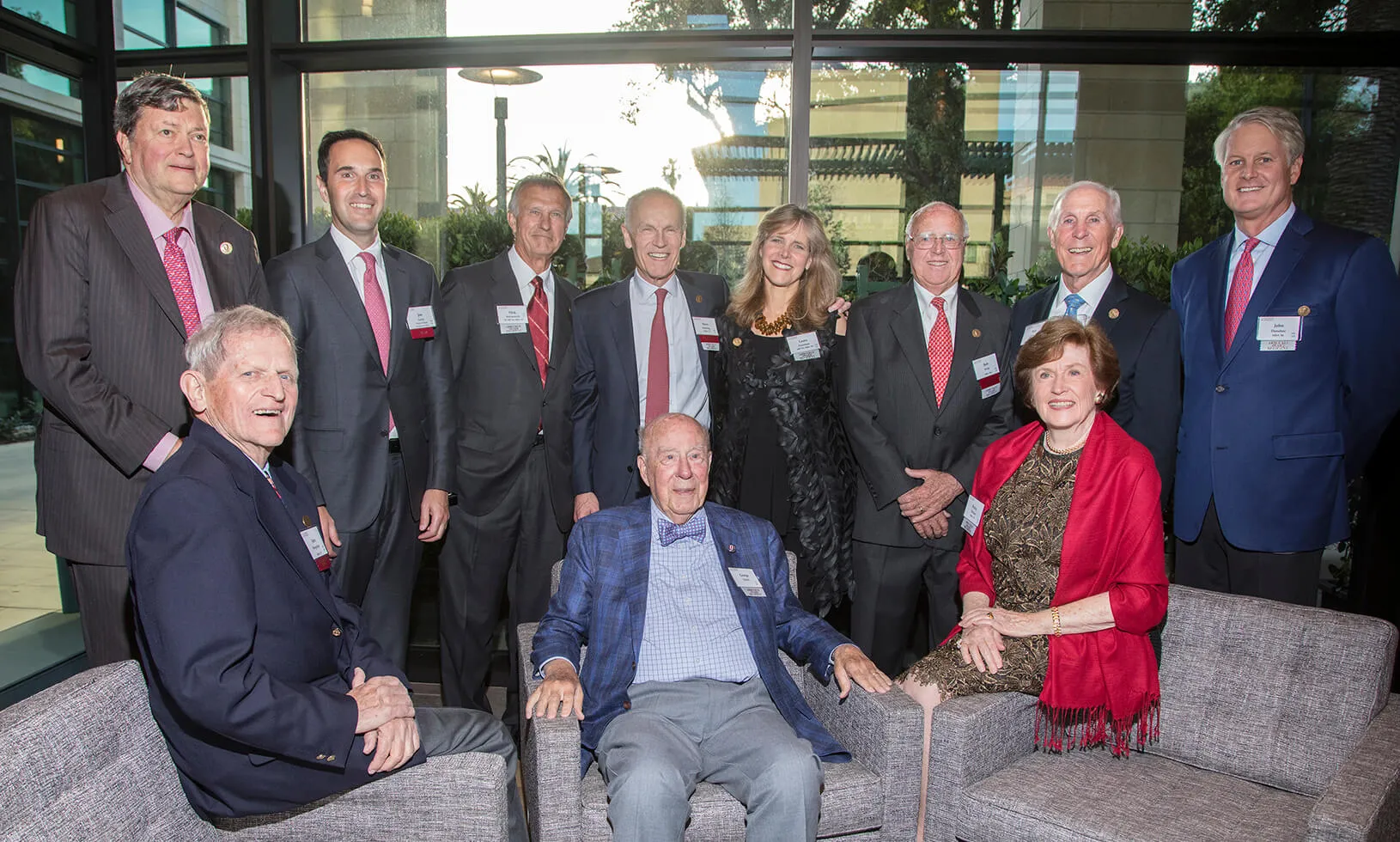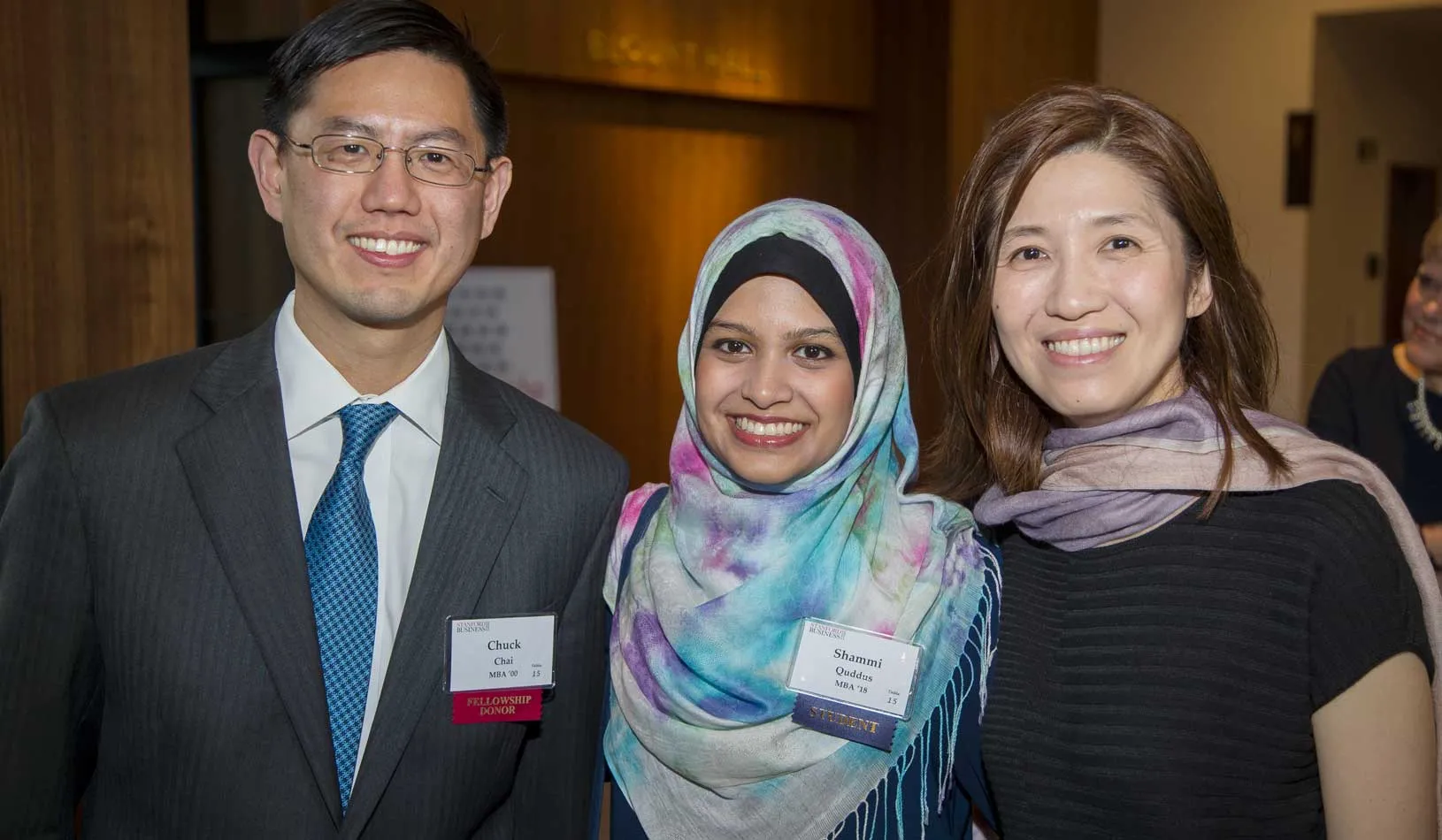July 06, 2018
The magnitude of the challenges facing the world today could make it tempting to “protect and maintain what we have,” said Steven A. Denning, MBA ’78, to the attendees at the 2018 Arbuckle Award Dinner on May 3. But, he warned, this incremental thinking “might be inadequate to meet the scale of the challenges we face.”
Instead, Denning, who accepted the 2018 Ernest C. Arbuckle Award, challenged graduates to take risks and pursue big goals.
The Arbuckle Award, given by Stanford Graduate School of Business, recognizes excellence in the field of management leadership. Named for the late Stanford GSB dean, it has been awarded annually since 1968 to honor top leaders who address the changing needs of society.
Denning, the award’s 2018 recipient, is chairman of General Atlantic LLC, a global private equity firm with over $25 billion of assets under management. He is also a director of Engility Corp., the Council on Foreign Relations, and the Bridgespan Group. At Stanford, he serves on numerous advisory boards and is the former chairman of the university board of trustees and Stanford GSB Advisory Council.
Denning joined General Atlantic after serving in the U.S. Navy for six years, getting his Stanford MBA, and working with McKinsey & Company. In addition to his MBA, Denning holds an MS degree from the Naval Postgraduate School in Monterey, California, and a BS from the Georgia Institute of Technology. Denning grew up in Salt Lake City and now lives in Greenwich, Connecticut, and San Francisco. He and his wife, Roberta, have two children.
Dean Jonathan Levin noted in his opening remarks that in times when the news is full of stories about leaders who fall short, this award recognizes leadership of great integrity and principle. Denning, Levin said, “is interested in every important issue, he shows up for every event, he has wise advice on every topic, and he has a magical ability to give everyone the feeling that he is absolutely, fully engaged on the things that matter most to them.”

Front Row: John Morgridge, George Shultz, Rebecca Morgan. Back Row: John Gunn, Jon Levin, Richard (Dick) Kovacevich, Steve Denning, Laura Esserman, Bob King, Bob Joss, John Donahoe
Gene Sykes, MBA ’84, spoke in his introduction about “the magic of Steve Denning,” including “his ability to inspire people to do more than they imagine they can do.” He noted Denning’s achievements, including spearheading the growth of General Atlantic, a capital campaign for Stanford, and the global expansion of the Nature Conservancy when he served as board chairman.
In his address, Denning described how he learned to take risks — and in doing so became one of only two members of his 500-student high school class to leave the state for college. He took the Naval ROTC scholarship exam as a senior in high school and won a full scholarship to any of 54 universities on the ROTC list.
“The bad news was that I hadn’t applied to any of these schools,” Denning said. He applied to Georgia Tech because the admissions deadline had not passed — and that was how he ended up getting on an airplane for the first time in his life to go to college.
“In so doing, I embraced a new mindset for myself: that I’d be willing to take risks and take initiative, even if it came at the expense of feeling comfortable or certain about what would come next,” Denning said.
That mindset led him, more than a decade later, to accept the challenge of helping to build General Atlantic. His interview for that job also gave him new insight: He asked the founder why he wanted to build this type of investment business, and the answer was to magnify his ability to give back.
“Here was a man resolute in his determination to improve the human condition and to do it in a selfless and ambitious way,” Denning said. “He had formed GA so he could build his net worth and turn around and give his wealth away.”
Denning said of GA’s founding mandate, which fueled his desire to work to improve the world: “It was unique, it was inspirational, it was an extraordinary opportunity.”
These turning points and others in his career have taught Denning that “the paths we pursue are often not a function of a grand design we can see, but rather of how prepared we are to respond to the unplanned opportunities that come our way. Will we stick to preconceived notions and strategies, or will we be adaptable and ambitious?”
Current challenges make this question even more urgent, Denning said: “The world faces many areas and aspects of disruptive change. Climate change is upon us, natural resources are vanishing, demographics are shifting, and human populations are swelling, all in ways that are potentially unsustainable.” Adding to the complexity are globalization and the digital revolution.
“Rather than simply improve what we have, we must push the limits to provide what is truly needed. We must be big, bold and daring in our thinking, and we must be willing to look outside of ourselves for answers,” Denning said.
Supporting Students
The Arbuckle Award dinner also annually serves to recognize donors who make it possible for Stanford GSB to provide fellowship support to more than 50 percent of the school’s student body.
One recipient was Shammi Quddus, MBA ’18, who received the Chai-Siriwatwechakul Family Fellowship. She wants to work on solving global development challenges and so is pursuing a concurrent Master in Public Administration in International Development degree from the Harvard Kennedy School.

“At Stanford GSB I have found faculty leadership and a peer community that is incredibly thoughtful about its role as moral business leaders in the world,” Quddus said. “I see my peers working on problems like climate change, infertility, elder care, substance abuse. As a Muslim woman from Bangladesh, I wondered how much I would fit into the business school community, but the school’s commitment to inclusion ever since orientation has impressed upon me that it takes the issue very seriously.”
Quddus said she almost didn’t apply to business school because she didn’t want debt to limit her options after graduation. “I knew I was going to come to Stanford GSB not when I got the call from the admissions office but when I got my fellowship award,” she said. “The financial support has also meant I was able to bring my daughter with me — otherwise I would have had to leave my 1-year-old back home in order to attend Stanford GSB.”
“We were so thrilled that she was the recipient,” said Chuck Chai, MBA ’00, president and chief investment officer of Hillspire LLC. He and his wife, Mon Siriwatwechakul, funded the fellowship to give other students the opportunity Chai had to attend Stanford GSB.
“I recognize that there are people at Stanford GSB from all backgrounds, including those of more modest means or from nontraditional backgrounds who seek to make a lasting difference in organizations,” Chai said. “Coming to Stanford GSB is about getting an unparalleled education in management and leadership that can be applied anywhere.”
For example, some may want to change the world by working for nonprofits or government, which is easier to do if they are not burdened by debt.
“My wife and I wanted to give fellowship recipients the opportunity to come and gain those leadership skills so they can go off and change lives for the better,” Chai said.
For media inquiries, visit the Newsroom.



